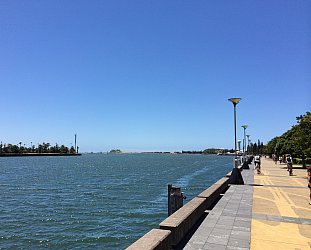Graham Reid | | 2 min read

Although I’m writing this on a fast, comfortable train hurling us towards London, this isn’t my favoured form of transport: you race past interesting places, just as this one is doing.
Oh, that was Lindisfarne in the distance we just passed.
That’s why I prefer a car: to stop, explore backroads and take your own route as we’ve done from Brighton in the south of England to Ullapool and beyond in Scotland’s north.
We looped around vast, beautiful and rugged Skye to remote villages -- sometimes just two houses, others even fewer – and stumbled on the wind-battered hilltop cemetery where Flora MacDonald (who saved the fleeing Bonnie Prince Charlie) is buried. There also is the huge headstone for the designer Alexander McQueen.
Without the car we couldn’t have made spontaneous digressions to John Lennon’s childhood home in Liverpool, seen Glamis Castle, passed through the fishing village of Eyemouth or taken our own route to lovely Cirencester, remote Lindisfarne or Shrewsbury where Charles Darwin – whose work challenged the relationship between Man and God -- was born.
Or found an unexpected museum in Fort William where the story of the nearby World War Two commando training centre is told. And from where Harry Alexander drove a Model T Ford to the top of rocky, snow-covered Ben Nevis and back in 1911.
With the freedom of a car considerably more comfortable than Alexander’s open vehicle, we had that luxury of spontaneity and -- because there were few tourists around, other than domestic -- we stopped and stayed where we wanted.
The only time we encountered tour groups was at Loch Ness when squadrons of American and Argentinians arrived for the same boat.
Everywhere else, perhaps because we were mostly staying in smaller towns or unusual accommodation -- notable at the eccentric, cluttered home in Inverness of Sergio who said, “the whole hoose is yoors” and showed us the whisky bottle – we were among the few guests.
In the 200-year old, 60 room Dreadnaught Hotel in Callander we seemed to be the only people in that massive rabbit-warren of rooms. The anxious Chinese owner told us he’d bought the business three years ago, then Covid arrived. So no one came.
Hospitality is suffering staff shortages everywhere because of Brexit and Covid, young people being trained where they are available. There were no young contenders in Callender.
By being free and unhurried we could chat with locals. We encountered the tiniest, most broadly Scottish, helpful and loudest Indian woman in Falkirk who ran a small laundrette. I laughed for hours afterwards.
We learned about ancient and contemporary British politics, extraordinary history and interesting people every day. We lost a glove and a beanie but picked up Covid, and caught television beamed in from previous decades, like The Avengerswith someone superimposed doing sign language.
I’ve no doubt sanctimonious people will condemn us for our carbon footprint and waste of fossil fuels. And maybe even suggest we are seduced by the colonising power.
I offer no excuses. We travelled to see family and to explore Scotland, the country of my birth which – unless the God of Lotto is kind – I doubt I’ll see again.
We travelled because we needed to hear different voices and opinions, experience the new and unexpected, and consider places with a history going back thousands of years before the first footprint on Aotearoa.
We all did that. And more.
I remember my father saying once when I was quite young, “What if there is a Heaven and when you get there, God asks what you’ve enjoyed in the world He created for you?”
I’ll be able to answer. At length.
Oh look, here comes London.
.
For other articles in this series go here.





post a comment